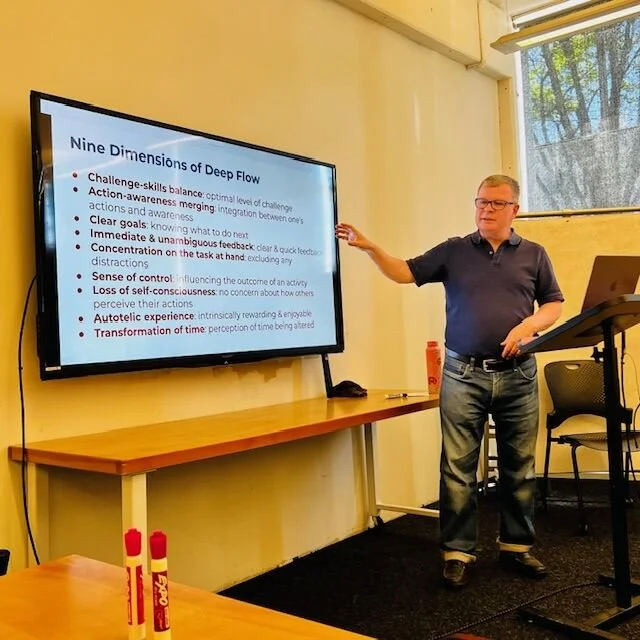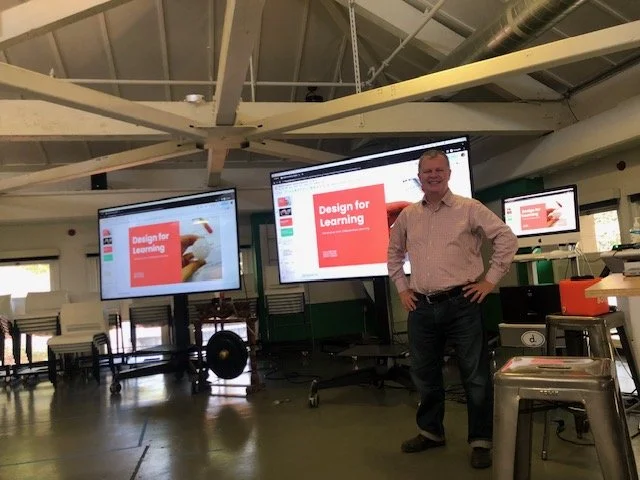Podcasts and Interviews
Apple Podcast
Upskilling in Game Design
How can UX practitioners upskill in game design for a learning context? And why is this important in EdTech?
Alicia Quan chats The Sims, cheat codes, and moving past the “Big 5” of gamification (points, badges, leader boards, levels, progress bars) towards something more with Chris Bennett.
The Engagement Challenge
In this session for the Digital Media Academy speaker series, Chris Bennett spoke about his work with Game Design Thinking, which combines the science of Game Design with Behavior Design and Neuroscience to measurably impact business goals.
Meet the Kinjo Team
“When we started Kinjo, we knew the importance of bringing on advisors skilled in game design and learning theory, and Chris Bennett is our unicorn - he’s an expert in both! It’s time to geek out about all things gaming and learning in this Kinjo interview with Chris Bennett!”
Game Design Thinking,
AI and Learning,
and Motivation
In this episode of the Wide Walls podcast, we explore the concept of Game Design Thinking and how to apply it when designing learning experiences. Chris also shares valuable insights about the impact of generative AI on education.
Recent Speaking
-

Limits of Classic Gamification and How to Overcome Them, Stanford Graduate School of Education, 2025
Chris spoke to the Digital Learning Design Workshop students about how great game design can increase motivation and engagement of learners.
EDUC 254: Digital Learning Design Workshop is a project-based course as part of the Digital Learning Initiative's Student Accelerator. In hands-on workshops, led by prominent academic and industry experts, students will define specific learning problems, recruit teammates, develop an approach to learning and community building using digital technology, create prototypes, test them with target learners, and progressively refine them for potential entry in the Digital Learning Design Challenge.
-

Beyond Gamification: Unveiling the Secrets of Student Engagement and Motivation: Teaching Engaged Brains conference, San Francisco, 2024
Chris spoke to a packed room of attendees at San Francisco’s historic Fairmont Hotel on the promise and limits of gamification. And charted a course towards deeper engagment with examples of popular video games and how we can use what we have learned to create more compelling pieces of digital learning.
This conference was part the of Learning & the Brain consortium.
-

Games and Product Design. Stanford Graduate School of Education, 2024
Chris lectured to this course which is offered to education and business graduate students
EDUC 475: Entrepreneurship in Education offers an exploration of education entrepreneurship within diverse global landscapes. We will delve into the education sectors of the United States, as well as emerging markets such as China, India, and Brazil, in order to investigate their unique characteristics and challenges. The course is open to anyone interested in the intersection of education and entrepreneurship on an international scale..
-

Beyond Gamification. California College of the Arts, San Francisco, 2024
Chris spoke to Masters of Interaction Design students on the affordances of great game design to inform more effective interaction design.
MDes in Interaction Design at CCA is a one-year, intensive STEM-designated program built to provide students with the tools to create better relationships among people, products, and environments worldwide.
-

Nine Dimensions of Deep Flow. Stanford Graduate School of Education, 2023
Chris co-taught this class that is core to the Learning, Design, and Technology Masters program at Stanford GSE.
EDUC 281: Technology for Learners asks the question how we use technology to improve learning? Many hope that technology will make learning easier, faster, or accessible to more learners. This course explores a variety of approaches to designing tools for learning, the theories behind them, and the research that tests their effectiveness. Strong focus on evaluating new tools for specific learners and subjects.
-

Simulations for Video Games and Education’ Stanford Graduate School of Education, 2023
Chris returned to lecture to a group of interdisciplinary teams learning how to create effective pieces of learning culminating in prototyping a piece of educational technology.
EDUC 391: Engineering Education and Online Learning is a project based introduction to web-based learning design. In this course we will explore the evidence and theory behind principles of learning design and game design thinking. In addition to gaining a broad understanding of the emerging field of the science and engineering of learning, students will experiment with a variety of educational technologies, pedagogical techniques, game design principles, and assessment methods.
-

How do we Design for Learning? Hasso Plattner Institute of Design (d.school) at Stanford, 2023
Chris lectured to a diverse group of undergraduate and graduate students at the Stanford d.school n why games are good pedagogical tools and what we can learn from them to aid effective design.
DESIGN 292: Design for Learning, where students develop creative ways to use generative AI to support collaborative learning. You will do this by tackling real design challenges presented by our project partners, which include several Stanford programs, while drawing on your own first-hand experience as students.
-

X is for eXcitement: Turning up attention and arousal’. Stanford Graduate School of Education, 2023
Chris returned to lecture to the Learning, Design, and Technology Masters seminar course, which is core to their program. His lecture was based on the book ‘The ABCs of How We Learn’.
EDUC 229B: LDT Seminar combines discussions and activities related to designing for learning with technology. Support for master's project. Theoretical and practical perspectives, hands-on development, and collaborative efforts.
“The magic happens when we stop trying to make things ‘fun’ and start focusing on making them meaningful.”

